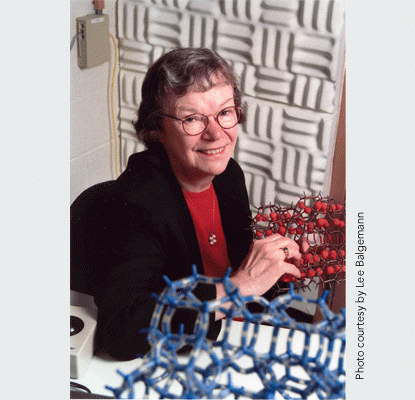Edith Flanigen
Edith Marie Flanigen began her career in chemistry in the early 1950s, at a time when few women were working in the field. It was also a very inventive and exciting time at Union Carbide, where Flanigen began work as a research chemist. In 2004 Flanigen won the $100,000 Lemelson-MIT Lifetime Achievement Award for her groundbreaking achievements in zeolite and molecular sieve technology.
Flanigen thrived in the entrepreneurial environment at Union Carbide and was asked to lead a team that discovered a whole new generation of synthetic molecular sieve zeolites. Together they uncovered over two dozen structures of molecular sieves and 200 compositions—several of which have been commercialized in petroleum refining and petrochemical processes to reduce energy costs and industrial waste.
Molecular sieve zeolites are a class of industrial materials used widely throughout the chemical, petrochemical and petroleum refining industries. A molecular sieve zeolite is a porous crystalline compound that contains molecule-sized pores that separate molecules on the basis of size. Smaller molecules are adsorbed into the sieve and larger molecules—larger than the pores—are excluded. They are used in everything from converting crude oil into gasoline and producing oxygen for portable medical oxygen units, to cleaning up nuclear waste, and removing water from refrigerant lines in refrigerators and automobile air conditioners. Zeolites can even be found in laundry detergents, where they are used to replace the environmentally suspect phosphate.
Flanigen is considered by her peers to be the foremost authority on zeolite chemistry and materials. Her discoveries have brought thousands of new scientists into the field and have expanded the scope of potential functionality for porous materials like molecular sieves. The holder of more than 100 patents, Flanigen has also developed a synthetic emerald that was designed for use in masers (predecessor to the laser) and was later part of a line of jewelry.
Flanigen credits a high school chemistry teacher for sparking her interest in chemistry. “She really made it exciting,” comments Flanigen. “We did hands-on laboratory work … and I think I fell in love with … chemistry at that time.” This same teacher—a nun—inspired Flanigen’s two sisters, who were also chemists at Union Carbide.
A native of Buffalo, N.Y., Flanigen earned a Bachelor’s Degree in chemistry (magna cum laude) from D’Youville College in Buffalo (1950) and a Master’s Degree in inorganic-physical chemistry from Syracuse University (1952). She began her career at Union Carbide after graduation in 1952, and became the first woman corporate research fellow there in 1973, and senior research fellow in 1982. In 1988 she became part of UOP, a joint venture of Union Carbide and Allied Signal, and remained there until retirement in 1994.
Flanigen remained active professionally and has served as ambassador to the world for zeolites, lecturing in several countries as part of her International Zeolite Association Award (1994). Flanigen, the first woman to win the Perkin Medal (1992), is an inductee in the National Inventors Hall of Fame (2004) and is the recipient of the Francis P. Garvan-John M. Olin Medal of the American Chemical Society (1993), as well as many other awards and honors.
Flanigen joined other inventors and educators from across the country to brainstorm ideas for a new math and science school to be built inside the former location of the National Inventors Hall of Fame. The group agreed that the environment of the school should be one that focuses on teamwork, creativity, problem solving, experimentation, invention, risk-taking, and "unexpected results." The National Inventors Hall of Fame STEM Middle School operates in Akron, Ohio currently.
Edith Flanigen received the National Medal of Technology in 2012 from President Barack Obama for her innovations in the field of chemistry.


